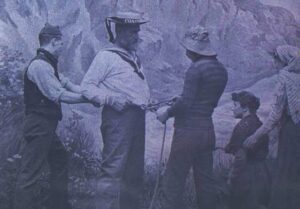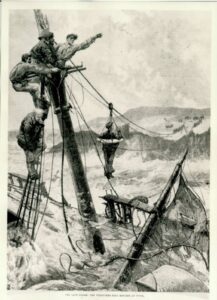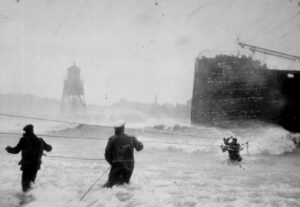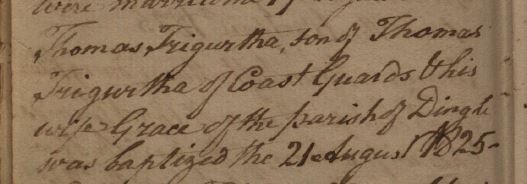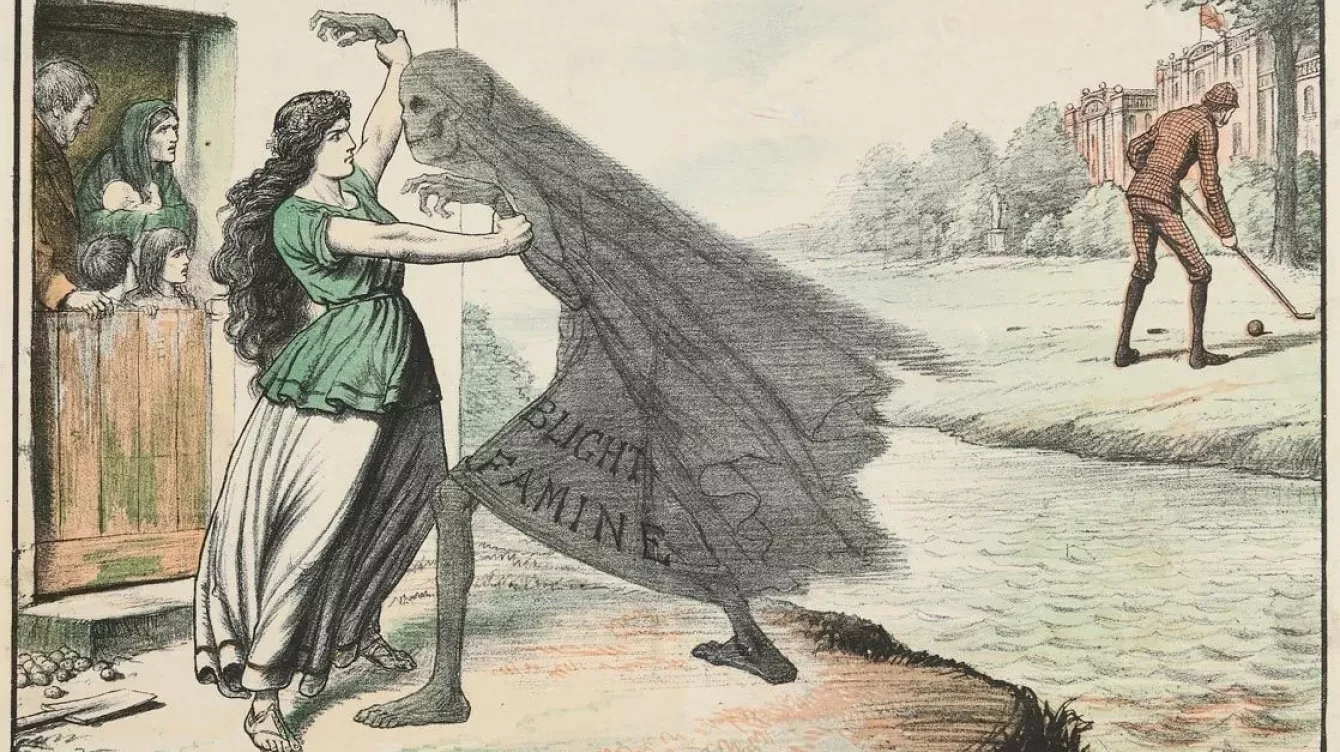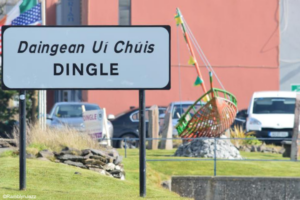Thomas Tregurtha was born in 1797 in the village of Paul, in Cornwall, England. In his late twenties, Thomas and his wife Grace (nee Pentreath) moved to the village of Dingle in Co. Kerry, Ireland. It was here that Thomas worked as a habour master for over 25 years, and where ten of his fourteen children were born. In fact, the Tregurtha family lived in Dingle during one of the most tragic times in the country’s history – the Great Famine.
Thomas Tregurtha was 22 years old when he married Grace Rickett Pentreath at St Paul’s Church in the village of Paul, Cornwall, on the 2nd July 1819. Two months later Grace gave birth to their first child – a son they named William Henry. Sadly, baby William Henry died 6 months later in March of 1820. Grace soon fell pregnant again, and the following year, in April of 1821 she gave birth to another son – and again they named him William Henry, in honour of the baby son they had lost. Two years later, in 1823, Thomas, Grace and baby William were living in Ireland – in the small coastal village of Dingle in Country Kerry.
When Thomas first arrived in Dingle, he was working with the Preventative Water Guard, but within a year his position changed when he became one of the first men to serve in the newly formed HM Coast Guard.
A Short History of HM Coast Guard
Today, HM Coastguard is a world leader in maritime search and rescue. Looking back 200 years to Thomas Tregurtha’s time, most goods, which now travel by road, were carried by hundreds of small ships. Every year, dozens of ships and hundreds of lives were lost within sight of the coast. Public shock and dismay at these maritime tragedies necessitated the creation of national life saving organisations. Though it’s beginnings lie in those decades, HM Coastguard originated not to meet the dangers of the seas but to combat a threat to the country’s economy and security – smuggling.
As soon as medieval taxes were charged on imports and exports, smuggling began. By 1743 the estimate was that half the tea drunk in Britain was illegally imported. Smugglers have often been romanticised but the reality was brutal. Local people lived in fear, with violent reprisals on informers and the murder of revenue officers, while corruption enabled smugglers to evade harsh penalties.
In 1809 the Board of Customs formed thePreventative Water Guard to fight smugglers, and this small force used boats to patrol every bay and cove. In 1816 the guard was placed under the Treasury and at each station, the chief officer and chief boatman were positions taken up by experienced naval seamen or fishermen. In bad weather they formed a shore patrol.
Although created to end smuggling, the Preventative Water Guard quickly acquired extra duties and were instructed to take responsibility of shipwrecks to safeguard cargoes and vessels from looters. In addition, the boatmen were to train with lifesaving equipment, supplied by the Board of Trade.
In 1821 a Committee of Inquiry examined every aspect of the Customs service. It recognized the Preventative Water Guard as a major force against smuggling and recommended that it again be controlled by the Board of Customs. In a minute dated 15 January 1822, the Treasury accepted the proposal noting the new force would be called ‘Coast Guard’ and there we have the beginnings of HM Coastguard. (Source: A Short History of HM Coastguard)
From this interesting history about HM Coastguard’s roots, and its proper beginnings in 1822, we know that Thomas Tregurtha was one of the first to hold this important, yet dangerous, position along the British coast at the time.
As mentioned above, Thomas, Grace, and their son William Henry, were living in Ireland by 1823 – and we know this because their third child, a daughter they named Elizabeth Rebecca, was baptised (and very likely born) in Dingle that year.
(NOTE: Thomas and Grace’s children were recorded in the baptism books with”Trigarter” as below, and many of them as “Trigurtha“).

Snippet from the Dingle baptism books showing Elizabeth Rebecca “Trigarter’s” baptism. Note that Thomas was recorded as being “of the water Guards”, whereas the next baptism below shows he was “of Coast Guards”.
Two years later, another child was born, a son they named Thomas “Trigurtha”.
In total, Thomas and Grace had 6 children:
- William Henry – b.1819 in Paul, Cornwall, England; died 1820 (age 6 mths)
- William Henry – b.1821 in Paul, Cornwall; died 1894 (age 72)
- Elizabeth Rebecca – b.1823 in Dingle, Co. Kerry.
- Thomas – b.1825 in Dingle, Co. Kerry.
- Nicholas – b.1828 in Dingle, Co. Kerry; died 1830 (age 2 yrs)
- Grace – b.1830 in Dingle, Co. Kerry.
Tragedy struck in 1833 when Thomas lost his wife Grace at the age of 34. Unfortunately we don’t know the cause of death, as this was a time just prior to civil registration; we only have her burial record. It’s possible Grace died in childbirth, or from TB, or another cause altogether.
Thomas was left a widow with 4 children, three of them under ten years old, and so he was quick to remarry. His second wife was Mary Ann Chinoweth, a 23 yr old spinster from the parish of Maker in Cornwall. Mary Ann’s father Samson Chinoweth, was also working in HM Coast Guard.
Thomas and Mary Ann had another 9 children together; however due to certain factors, we could only find the baptisms of five. It was through later census documents that we were able to confirm the names of four others. The census also showed that they were all born in Dingle, between 1836 – 1850. Their names were:
- Mary Anne – b.1836
- John Nicholas – b.1839
- Sarah Ellen – b.1840
- Susanna Ellen – b.1844
- George – b.1847
- Georgina – b.1847
- Stephen – b.1849
- Samson (aka Samuel) – b.1850
- Anne – b.1855
Those in bold above, are the ones missing from the baptism registers…and we believe this was almost certainly because of an event that happended in Ireland at the time – the Great Famine. Beginning in 1845, the famine lasted until approximately 1852, however, the lasting effects from the Famine (if you know your Irish history) grieved families well into the early 1900s. It was the single most catastrophic event to hit Ireland ever. Known worldwide by fellow Irishmen as an Gorta Mór, or the Great Hunger, few families could say after it was over, that they had not lost someone close. We can be certain that our Irish Tregurtha ancestors were affected by its devestations in some way, whether through the loss of family or at the very least, close friends.
The Irish Potato Famine – A Brief Video about the tragedy
(Irish Tregurthas – Part 2 will be featured in our next Newsletter as we await further documentation and evidence of their later lives).
